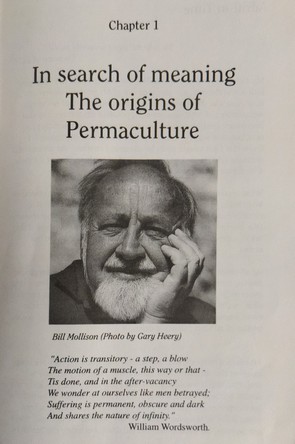Shipping From The USA. Pricing In USD.

Chapter 1
In search of meaning
The origins of
Permaculture
Who are you, who am I?
Who are we? Are we the person others see, and experience, are we the reflection of ourselves in the mirror of others’ eyes or are we the person we believe we are, deep down? Are we the public or private person, or are we (as is so often true) all of these things? Are all of us, in fact, everyman?
There would be at least two ways to assemble an autobiography; the first would be never to approach the subject, but to enquire about them from both friends and foes; also from non-acquaintances who nevertheless may have strong opinions on the victim. The second is to use the subject person as source, together with any supporting material available. For myself, the two are inextricable, and every subject needs two autobiographies (if any), and those would, or could, define two people.
What I have learned is that we do not appear to others as we appear to ourselves; we are often, if not always, unaware of strong expectations in others, and this results in a set of disappointments in them, and often a surprise in ourselves at being ‘misunderstood’. People who seek us out may have specific agendas – this seems often to be true – and our own agendas may be set long before, and can ignore, exclude or re-direct other and intruding agendas.
Nevertheless, critiques from good friends or lovers must be heard and understood; this is how we modify our worst behaviour, year by year, or suddenly. Dramatic changes almost always result from traumatic events. We are all, male and female, capable of every form of behaviour possible to people. That we do not often display the extremes of behaviours, means that we remain ‘normal’, able to function in our contemporary society, but we must never believe that, given the right conditions, we would not display abnormal, antisocial, or aberrant traits. We can do so, and may do so, tomorrow.
We would all be happier without our expectations, and I believe I have a very few, except that I expect I will die before long (being old). This is how I travel – take things as I find them, more curious and adaptive than ‘disappointed’ or amazed.
We have more than one mode of experience, or perception; the one we can mostly agree on is that common evidence of our senses, which we use not only to directly record natural events, but also to read and interpret the records of devices, like electric sensors, which can detect events invisible to our unaided senses; we call such second-hand records, measurements. Yet, we choose to make measures of those things that we can imagine, and of these, only a selection. Can we imagine that orders of phenomena exist that we are yet to measure? Of course, we now are looking for the dark matter of the universe!
Yet it is most of the thousand things that escape measure, either because they are unmeasurable, the area of leaves on a field, or because we do not choose to measure them, the distance a fish swims, the quantity of heat absorbed by tree species. Other things available to our senses but unmeasured, or unmeasurable, may yet be of common experience (déjà vu, doppelgangers, flashes of different lives). Because we can agree that many of us have these common perceptions, we must at least agree that such phenomena are part of human experience, but because the instances of observation are mainly unpredictable and always or mostly personal (common or shared views however, are recorded), we cannot measure them.
By living, we process all our perceptions; those of our measures are no more real for us than those of our private and fluky perceptions, or those of our emotions, or our thoughts. It is only reasonable, one is tempted to say ‘fair’, to record all perceptions or experiences, and let them lie; this is how it is for me; take it or leave it, but it is probably much the same for you. And this is how I approach this writing of my life perceptions.

